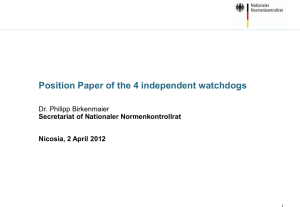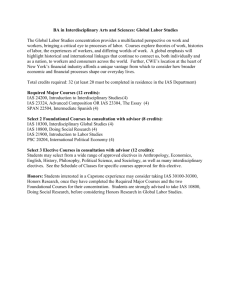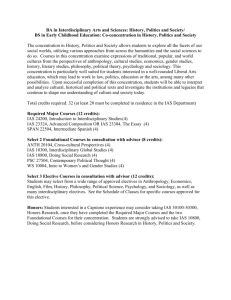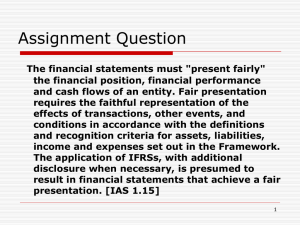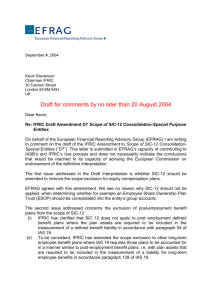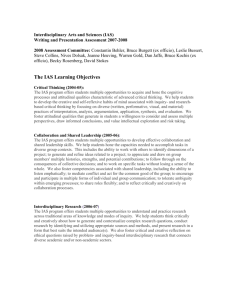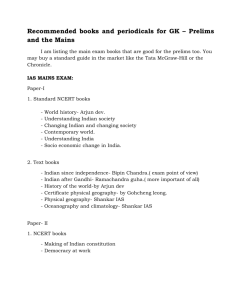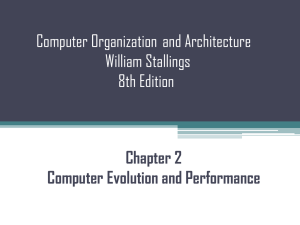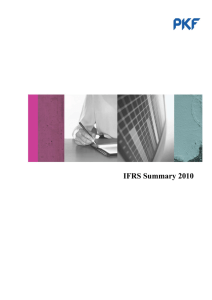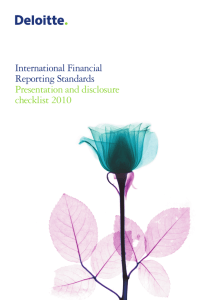ISSUE PAPER ON DE FACTO CONTROL
advertisement
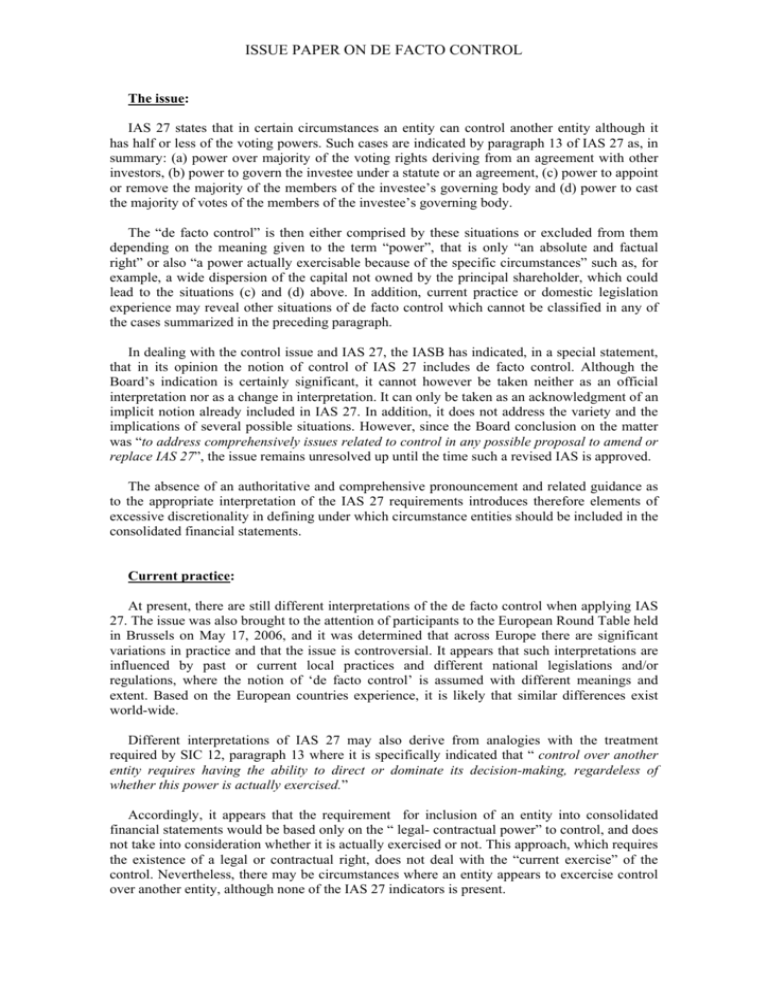
ISSUE PAPER ON DE FACTO CONTROL The issue: IAS 27 states that in certain circumstances an entity can control another entity although it has half or less of the voting powers. Such cases are indicated by paragraph 13 of IAS 27 as, in summary: (a) power over majority of the voting rights deriving from an agreement with other investors, (b) power to govern the investee under a statute or an agreement, (c) power to appoint or remove the majority of the members of the investee’s governing body and (d) power to cast the majority of votes of the members of the investee’s governing body. The “de facto control” is then either comprised by these situations or excluded from them depending on the meaning given to the term “power”, that is only “an absolute and factual right” or also “a power actually exercisable because of the specific circumstances” such as, for example, a wide dispersion of the capital not owned by the principal shareholder, which could lead to the situations (c) and (d) above. In addition, current practice or domestic legislation experience may reveal other situations of de facto control which cannot be classified in any of the cases summarized in the preceding paragraph. In dealing with the control issue and IAS 27, the IASB has indicated, in a special statement, that in its opinion the notion of control of IAS 27 includes de facto control. Although the Board’s indication is certainly significant, it cannot however be taken neither as an official interpretation nor as a change in interpretation. It can only be taken as an acknowledgment of an implicit notion already included in IAS 27. In addition, it does not address the variety and the implications of several possible situations. However, since the Board conclusion on the matter was “to address comprehensively issues related to control in any possible proposal to amend or replace IAS 27”, the issue remains unresolved up until the time such a revised IAS is approved. The absence of an authoritative and comprehensive pronouncement and related guidance as to the appropriate interpretation of the IAS 27 requirements introduces therefore elements of excessive discretionality in defining under which circumstance entities should be included in the consolidated financial statements. Current practice: At present, there are still different interpretations of the de facto control when applying IAS 27. The issue was also brought to the attention of participants to the European Round Table held in Brussels on May 17, 2006, and it was determined that across Europe there are significant variations in practice and that the issue is controversial. It appears that such interpretations are influenced by past or current local practices and different national legislations and/or regulations, where the notion of ‘de facto control’ is assumed with different meanings and extent. Based on the European countries experience, it is likely that similar differences exist world-wide. Different interpretations of IAS 27 may also derive from analogies with the treatment required by SIC 12, paragraph 13 where it is specifically indicated that “ control over another entity requires having the ability to direct or dominate its decision-making, regardeless of whether this power is actually exercised.” Accordingly, it appears that the requirement for inclusion of an entity into consolidated financial statements would be based only on the “ legal- contractual power” to control, and does not take into consideration whether it is actually exercised or not. This approach, which requires the existence of a legal or contractual right, does not deal with the “current exercise” of the control. Nevertheless, there may be circumstances where an entity appears to excercise control over another entity, although none of the IAS 27 indicators is present. ISSUE PAPER ON DE FACTO CONTROL For example, if entity A owns a relatively dominant share of the voting powers of entity B but the majority of them is held by a wide number of other parties, and A positions are not opposed in the meetings so that the members of the B governing bodies are nominated by A, entity A has de facto control over B. Nevertheless, a narrower interpretation of the IAS 27 requirements as the existence of the majority of legal rights would lead to the conclusion that A should not consolidate B. At the same time, IAS 27 does not address the issue of the effect of certain eventual minority rights, although there may be cases where it is necessary to consider their nature and extent in determining control. For example, if the minority shareholders are granted the right to block significant decision of the majority in the ordinary course of the business, the current exercise of such rights might override the presumption of control by the majority owner when considered in the circumstances taken as a whole. A useful reference to such a situation can be found in U.S. GAAPs, EITF 96-161, which distinguishes between minority right of a mere protective nature from rights actually participative. Examples of cases where the minority rights should be taken into proper consideration are: the right to appoint or remove governing body members, to set their remuneration, to make operating and capital decisions, including approval of budgets in the ordinary course of operations. Reasons for the IFRIC to address the issue: We believe the approach of the Board in revising IAS 27 is appropriate. However, current Board’s agenda, considering the time necessary2 for resolving the controversial implications of defining ‘de facto control’ appears excessive when compared to the relevance of the issue. Any subjective interpretation made by the preparers of financial reports during this time may have significant consequences in a subsequent period, should it then result not compliyng with the authoritative pronouncement. In turn, this may cause additional costs to the preparers for restating their prior period noncompliant consolidated accounts, as well as possible fluctuations in the stock markets and different opinions by the financial analysts. We believe that in the wait for the revised version of IAS 27 an IFRIC interpretation of current requirements is appropriate. Submitted by: Name: Organisation: Address: Phone: e-Mail: 1 2 Angelo Provasoli (Chairman) OIC - Organismo Italiano di Contabilità via Poli, 29 39 06 6976681 oic@fondazioneoic.it “Investors accounting for an investee when the investor has a majority of the voting interest but the minority shareholder or shareholders have certain approval or veto rights” See IASC Foundation, Annual Report 2005, Paragraphs 36-38:
